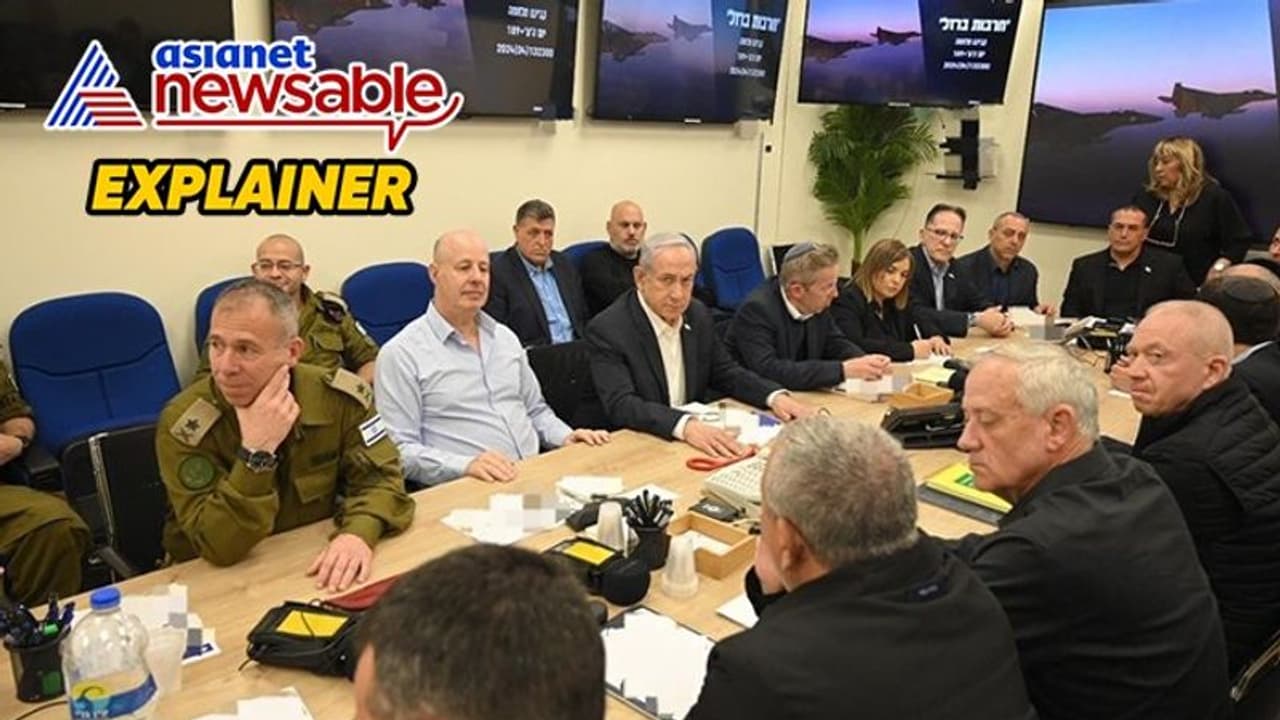Over 300 drones and missiles were launched by Iran against military targets within Israel on Sunday, an action US President Joe Biden characterized as 'unprecedented'.
Israel has pledged to retaliate against Iran for the extensive aerial assault on the Jewish state over the weekend, vowing to "exact a price." While many analysts anticipate Israeli response, uncertainties persist regarding the timing and magnitude of such retaliation. Over 300 drones and missiles were launched by Iran against military targets within Israel on Sunday, an action US President Joe Biden characterized as 'unprecedented'.

Following the attack, Israel's war cabinet and top security officials held a meeting in Tel Aviv to decide over how the country would respond to Iran’s massive missile and drone barrage. According to the Times of Israel, the deliberations were carried out for over three hours, but the war cabinet did not arrive at any conclusive decision and is expected to reconvene on Monday.
The Israel Hayom daily newspaper quoted an Israeli official affirming that "there will be a response," while NBC network cited a source from the Prime Minister's Office stating that although a decision is pending, "the IDF will need to present options," indicating Israel's clear intention to retaliate.
Ahead of a war cabinet meeting on Sunday, Israel’s centrist minister Benny Gantz vowed to “build a regional coalition and exact the price from Iran in the fashion and timing that is right for us.”
Iran has justified its attack on Israel as a response to an alleged Israeli strike on its embassy compound in Damascus, Syria earlier in the month. The Iranian regime accuses Israel of carrying out the April 1 attack, which resulted in the deaths of seven Iranian military personnel, including senior commanders.
Iran's envoy to the United Nations has cited self-defence as the rationale behind the country's actions.
“This action was in the exercise of Iran’s inherent right to self-defence as outlined in Article 51 of the Charter of the United Nations, and in response to the Israeli recurring military aggressions, particularly its armed attack on 1st April 2024 against Iranian diplomatic premises,” Iran’s UN Ambassador Amir Saeid Iravani said.
What analysts expect could happen
Ryan Bohl, senior Middle East and North Africa analyst at risk intelligence platform Rane Network, was quoted in a CNBC report as saying, "Right now, they certainly are seriously considering direct strikes on Iran, because that is a clearest path back to deterrence."
However, Bohl noted that Israel will need to tread carefully, as they aim to avoid an overt conflict with Iran. He emphasized the possibility of a "covert escalation," where Israel intensifies its shadow war with Iran while keeping it out of the public eye.
While President Biden has assured Israel of an "ironclad" commitment to its security against Iranian threats, he has also made it clear to Israeli Prime Minister Benjamin Netanyahu that the US will not engage in any offensive operations against Iran, according to a senior administration official speaking to NBC News.
Iran has long funded and supported organisations that oppose Israel, such as the Palestinian terrorist group Hamas, and the two countries have been at conflict for many years. It's common to refer to the current violence in Gaza as an indirect fight between Iran and Israel. Tehran has also backed the Syrian government led by President Bashar al-Assad, Yemen's Houthis, and Lebanon's Hezbollah.
"Strategically, I think you will see movement from Israel within a week," said David Roche, president and global strategist at Independent Strategy, to CNBC. Roche does not anticipate Israeli forces targeting Iranian oil facilities, as such action would "displease all of their supporters" including the United States.
Roche suggested that Israel's immediate response might be moderate. However, he did not dismiss the possibility of "extreme retaliation" being considered at a later stage, possibly a year or more from now.
“If you got the most extreme form of retaliation — which I don’t think you will get now — but you will get inevitably within a year or 18 months, against Iran’s nuclear capacity, then I think you’re into a market meltdown,” he told CNBC on Monday.
"But I stress you’re de-escalating within a higher level of escalation, which is here to stay, which I think due to the nuclear threat from Iran, is destined to move higher over the next 18 months by a big jump," Roche added.
What's next for Iran
Bohl emphasized that regardless of Israel's response, Iran is likely to continue attempting to destabilize the global economy. He suggested that Iran would do so just enough to prompt diplomatic pressure from the United States on Israel to de-escalate tensions.
"No matter how Israel responds, Iran is going to try to rattle the global economy increasingly, but only just enough that the United States puts diplomatic pressure on Israel to de-escalate," Bohl told CNBC.
Before the drone and missile strike on Israel, Iran seized an Israeli-linked container ship in the Strait of Hormuz, a crucial oil trade route.
“That sort of harassment and behavior is likely to continue in some fashion, what scale of it is probably going to be gauged by how hard Israel goes after Iran,” Bohl added.
Iran has indicated that its attack on Israel has ended for now. "Operation Honest Promise... was completed successfully from last night to this morning and achieved all its objectives", Mohammad Bagheri, the Iranian armed forces' chief of staff, told state TV on Sunday.
He further stated, "The reason for launching this operation was that the Zionist regime crossed Iran's red lines. We see this operation as completed and there is no intention to continue, but if the Zionist regime responds, our next operation will be much larger."
“The matter can be deemed concluded,” Iran’s mission to the United Nations said on social media platform X.
However, it warned “should the Israeli regime make another mistake, Iran’s response will be considerably more severe,” adding that the U.S. should “stay away” from the conflict between Israel and Iran.
